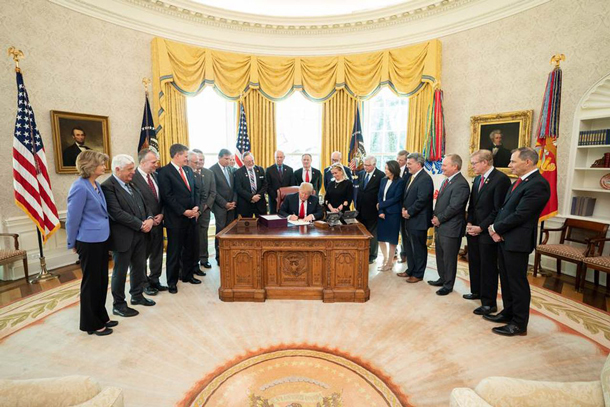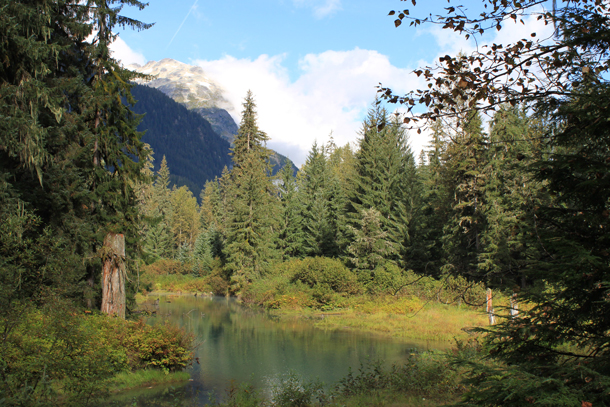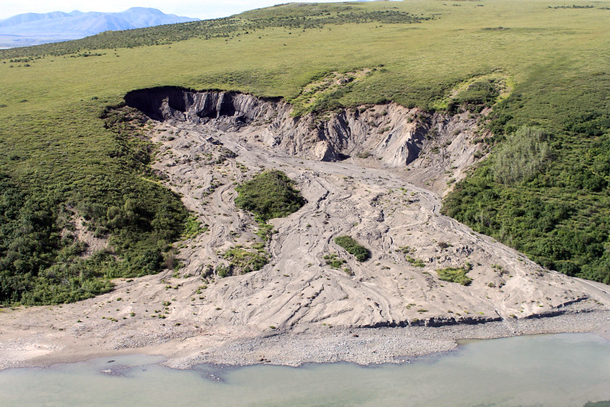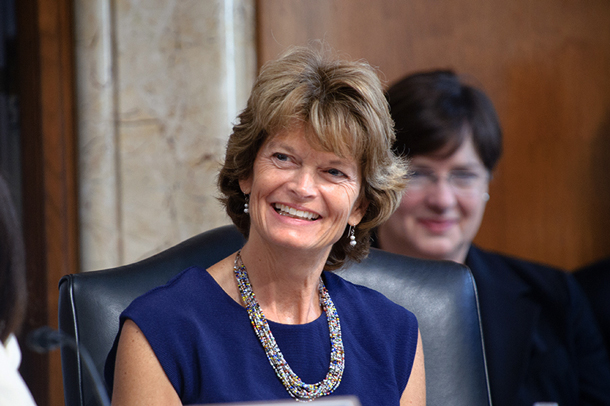Senator Lisa Murkowski Talks Up Public Lands
Air Date: Week of January 17, 2020

President Donald Trump signs the John D. Dingell Jr. Conservation, Management and Recreation Act on March 12, 2019, in the Oval Office of the White House. Sen. Lisa Murkowski, the bill’s sponsor, stands at far left. (Photo: Official White House Photo by Shealah Craighead)
Senator Lisa Murkowski (R-AK) is known for reaching across the aisle to broker bipartisan deals, including the bipartisan 2019 Dingell Act to protect and expand public lands. Host Steve Curwood and Senator Murkowski discuss the Dingell Act and her plans for her final year as Chair of the Senate Committee on Energy and Natural Resources. They also cover her views on the Trump Administration’s plans to exempt the Tongass National Forest from the roadless rule, and the need to balance oil drilling and climate concerns in the state nicknamed “The Last Frontier”.
Transcript
BASCOMB: It’s Living on Earth, I’m Bobby Bascomb.
CURWOOD: And I’m Steve Curwood.
As the US Senate prepared for the historic impeachment trial of President Donald Trump, the first person to reach across the aisle from the Republican side to the Democratic minority on the question of witnesses was Alaska’s senior Republican Senator Lisa Murkowski. And few were surprised as Senator Murkowski is known for brokering bipartisan deals, including pulling together more than 100 separate bills to enact the 2019 Dingell Act to protect and expand public lands. The law creates new national monuments, parks and wilderness areas and fixes some local concerns, such as land allocation rights for Alaska’s Native American Vietnam veterans. Because of Republican term limits Lisa Murkowski is in her last year as Chair of the Senate Committee on Energy and Natural Resources. And this year won’t be without controversy as the Trump administration seeks to exempt the largest remaining temperate rainforest in the world, the Tongass National Forest in Alaska, from roadless protections. Senator Murkowski joins us now from the Capitol. Welcome to Living on Earth!
MURKOWSKI: Good to be back with you, Steve, thank you for the invitation.
CURWOOD: Our pleasure. Time flies. So, your last five years as Chair of the Senate Committee on Energy and Natural Resources, had a number of events including this 2019 Public Lands Act, I guess it's called the Dingell Act. What are you most proud about that?
MURKOWSKI: Well, I'll tell you. I think the thing that makes me most proud of that package was that it was probably the most substantive land/water conservation bill that has been signed into law in at least a decade. But the fact that we advanced 120 bills together in a package, and received overwhelming bipartisan support, at a time when -- we were in the midst of a government shutdown last year, when, when we began moving this through, when theoretically, Republicans aren't talking to Democrats and the administration was not being cooperative. What we were able to do was pretty impressive. And we not only moved it out of the Senate overwhelmingly, 85 to 12, it then moved over to the House. And the House had switched hands, from Republican leadership at the time that this package was created, to now in control of the Democrats. And the package that we had worked on had been done so cooperatively through the process. And so when the House took up the Senate-passed bill, and didn't make any changes, adopted it 366 affirmative votes, and then to have the president then stand behind it and applaud the work that went to it. That was as important to me as anything. And it was a reminder to me that care about our public lands, our waters, how we care for these lands -- these are issues that can bring us together, rather than divide us, particularly at partisan and divisive times. So I think in retrospect, that's probably the thing that I was most proud of.

Alaska’s Tongass National Forest is home to the largest remaining temperate rainforest in the world. (Photo: Ian, Flickr CC BY-NC 2.0)
CURWOOD: A while back, I was visiting Prince of Wales Island, speaking to some Native American Vietnam vets, who were very concerned that when they came back, they never got the land allotments. What did you do in this act that made them whole?
MURKOWSKI: What we were able to do, and in fairness, the final solution is not one that makes everybody happy, because in an effort to make sure that those who had been denied that opportunity to file for their allotments because again, they were serving their country. We basically were able to reopen so that they could make application for their allotments. But what we weren't able to do was to open it to areas that they had perhaps had close connections to the land prior to their service, because these lands were now either in the Tongass, or they were in parkland, or wilderness area. It was important for a compromise to recognize that there were going to be some lands that were off limits. But we have allowed now for equity for those who were denied the opportunity while they were serving their country.
CURWOOD: Let's talk more about the Tongass National Forest. The Tongass is, what, 40% of our whole National Forest assets. And I understand there are plans to exempt the Tongass now from the roadless rule, that of course limits logging there, and you welcome this decision. Why is the Tongass different in this regard than other forests where the roadless rule does apply?
MURKOWSKI: Well, I think it's important to put the Tongass into context. You note the size; the Tongass is the largest national forest in the country, at 16.7 million acres, it's larger than West Virginia. It's about 80% of the land base there in Southeast Alaska. And there's 32 islanded communities within Southeast; I happen to have been born in one of them, in Ketchikan; lived in Wrangell, and in Juneau. And these are communities that are surrounded by a National Forest. One reality to the Tongass, and those who live there know this very well: it is overwhelmingly road-free, unlogged, rich in wildlife. And what I think is important to stress is it will remain so, even if exempted from the roadless rule. The debate that is going on now and what is happening as they're moving through the draft environmental impact statements is that we have been dealing with a roadless rule that, in my view, has been kind of a one-size-fits-all approach, an additional layer of regulation that I have maintained, the other members of the delegation have maintained, the governor has maintained, previous governors have maintained, just should never have been applied to the State of Alaska. And we're not talking about an opportunity to clearcut the Tongass. What we're talking about is access for some of the smaller operators to be able to, to have a somewhat reliable, albeit small, supply of timber. But it's more than access to just timber. It's access to be able to build a road to allow for renewable energy operations; to be able to allow access to individuals for whether it is recreation or harvesting firewood. And so when we talk about access, I think it's important to recognize that relieving the Tongass from the roadless rule is not going to open it up to unlimited, unrestricted timber harvest. There are so many other protections at the state and at the federal levels to ensure that the Tongass is as we know it, a rich and truly beautiful area, and an area that can sustain the local communities with the small economies that they have.
CURWOOD: Alaska is beautiful, and also it's energy. How do you balance the effect of carbon based energy, where you see communities like Shishmaref dealing with climate change, and your economy in Alaska where there's plenty of hydrocarbons, and much of the economy is based on extracting those? How do you balance that going forward on the public lands? How do you balance the risks of climate disruption against the question of using oil and gas?

Earth’s poles are warming much faster than the globe as an average, and Alaska is already experiencing climate impacts from thawing permafrost. (Photo: NPS Climate Change Response, Flickr CC BY 2.0)
MURKOWSKI: Well, it's something that in Alaska, we have always been challenged to try to achieve balance. When it comes to climate change, we know, in Alaska, we're on the front lines, there's no question that our climate is changing - we are seeing it. And so my big push to us in the state, and really, to us in this country is, we have resources that come from our ground. We have an obligation and a responsibility to be good environmental stewards. So as we access these resources to our benefit, what are we doing to make sure that we are limiting our impact, whether it is levels of emissions or whether it is just waste. So utilizing the technology, utilizing a level of research and development, whether it's pushing out on carbon capture and utilization, storage, efficiency, advanced renewables, what we are doing every day to develop new and cleaner technologies that will help us reduce our carbon output is something that I think we need to be focused on every day. This is what we need to do in Alaska, this is what we need to do around the country. On the Energy Committee, we spent a fair amount of time this past year focusing on what we're seeing with climate change. We've had hearings on energy innovation, we had another one on the electricity sector in a changing climate; good, good discussions about solutions that can help us diversify our energy portfolio, to integrate more renewables into the grid, more R&D, greater investments in clean energy. So, making sure that the national conversation gets us to a better place, a healthier place, we need to be able to talk about it so that we can get to solutions.
CURWOOD: And because of Senate Chair limits, of course, this is your last year now as Chair of the Senate Committee on Energy and Natural Resources. What would you like to accomplish during this last year?

Senator Lisa Murkowski (R-AK) chairs the Committee on Energy and Natural Resources (Photo: Committee on Energy and Natural Resources)
MURKOWSKI: Well, I have an energy bill that I've been working on now for several years. We haven't seen substantive energy reform since 2007. So I am working with my partner on the committee, Senator Manchin from West Virginia, our staffs are going through over 50 different bills that we have worked on over the past year to put together an energy package that the Senate, the House and hopefully the President can all sign off on. But when you think about where we were in 2007, iPads had not even been invented then. We haven't reformed our energy laws since then. We've got some updating that needs to happen. We're going to be ready to go here very shortly with this. And that, to me would be significant, it would be enduring, and in my view, long past due. So that's going to be my big push early this year, is to get our energy laws updated -- everything from what we're doing with renewables, to cyber security, to efficiency, to nuclear. So we've got a lot on our plate, lot of work, and we're going to be moving.
CURWOOD: Lisa Murkowski is the senior Senator from Alaska and Chair of the Senate Committee on Energy and Natural Resources. Senator, thanks so much for taking the time with us today.
MURKOWSKI: Thank you for the opportunity to be back with you. Look forward to it again.
Links
Listen to our interview with Senator Murkowski on the passage of the 2019 Dingell Act
Listen to our interview with public lands bill cosponsor Sen. Maria Cantwell (D-WA)
Read the full Senate Bill, the “John D. Dingell, Jr. Conservation, Management, and Recreation Act”
NYTimes | “Forest Service Backs an End to Limits on Roads in Alaska’s Tongass Forest”
Living on Earth wants to hear from you!
Living on Earth
62 Calef Highway, Suite 212
Lee, NH 03861
Telephone: 617-287-4121
E-mail: comments@loe.org
Newsletter [Click here]
Donate to Living on Earth!
Living on Earth is an independent media program and relies entirely on contributions from listeners and institutions supporting public service. Please donate now to preserve an independent environmental voice.
NewsletterLiving on Earth offers a weekly delivery of the show's rundown to your mailbox. Sign up for our newsletter today!
 Sailors For The Sea: Be the change you want to sea.
Sailors For The Sea: Be the change you want to sea.
 The Grantham Foundation for the Protection of the Environment: Committed to protecting and improving the health of the global environment.
The Grantham Foundation for the Protection of the Environment: Committed to protecting and improving the health of the global environment.
 Contribute to Living on Earth and receive, as our gift to you, an archival print of one of Mark Seth Lender's extraordinary wildlife photographs. Follow the link to see Mark's current collection of photographs.
Contribute to Living on Earth and receive, as our gift to you, an archival print of one of Mark Seth Lender's extraordinary wildlife photographs. Follow the link to see Mark's current collection of photographs.
 Buy a signed copy of Mark Seth Lender's book Smeagull the Seagull & support Living on Earth
Buy a signed copy of Mark Seth Lender's book Smeagull the Seagull & support Living on Earth

